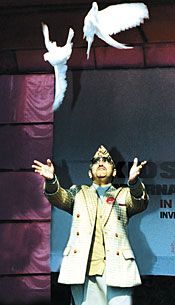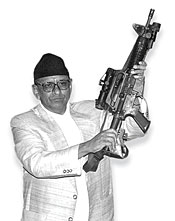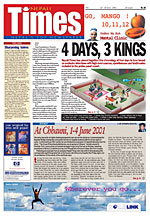 |
 PRADEEP SHRESTHA |
Those were the last words King Birendra spoke as he collapsed in the billiard room on Friday, 1 June 2001. Shock, rather than pain, was writ large on his face. More than the shock of being shot, it was the shock of knowing who had just shot him.
"What have you done", he murmured, as he slowly slumped to the floor. Nepalis will also want an answer to that haunting question as they agonise over what happened that night. As individual citizens, and as a nation, we will have to come to terms with this unspeakable slaughter and move on with our lives in the days ahead. We will soon know what happened, we will be told in excruciating detail of the exact sequence in which the royals were slain, we will get the forensic and ballistic evidence, we will hear clinical descriptions of how many bullets, and about the nature of the fatal wounds. There may even be hints as to motive.
 |
Some of us will seek solace in the Gita. But even our holy books didn't foresee senseless carnage on such a wild scale - not among the warlike gods of our pantheon, not among lesser mortals. But the Gita does have a message that is relevant: how to gain wisdom from suffering. The epic battles of Kurukshetra, the jealousies, greed and vanity that afflicted our gods bring them down to a human level so that we can recognise our own failings in them. Our holy books, like Greek tragedies, bestow upon readers a sense of relief by catharsis.
 |
The fact that our democratic institutions have withstood this crisis more or less intact is an indication that despite our deep sense of insecurity and loss of self-esteem, our multi-party setup is much stronger than we might have thought. Our pluralistic democracy, free press, our civil-military relations, the government-palace combine took a major battering, but the institutions of democracy showed a hidden resilience. Let us not underestimate the power of our democracy to survive and adapt.


